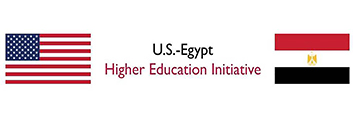
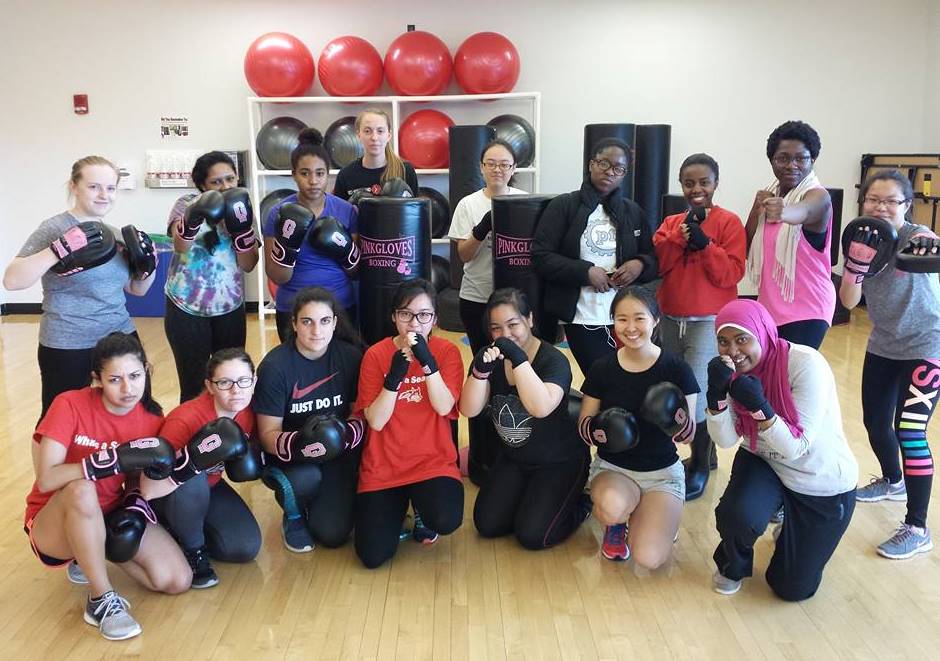
Success Stories
Amira Khalil – From Challenges to Achievements
USAID-funded HEI scholar Amira Khalil arrived to the United States in August 2015 to begin a Master of Business Administration (MBA) at the State University of New York Stony Brook (SUNY Stony Brook). When she first arrived to the United States, Amira faced challenges that other international students face, including adjusting to a new country (and in particular, a college town like Long Island); exploring the services and activities offered by her university; finding convenient housing; and socializing and building a network. Amira said she “felt like a stranger; it was difficult to fit in.” She was unsure of what people thought about an international Muslim woman at her university.
Despite this rocky start, Amira researched organizations to find information. She found a pamphlet for international students on surviving life at Stony Brook. During the second semester, Amira began participating in on-campus community groups. She attended events for the Muslim Student Association, including community service activities. She also joined a boxing club that she had learned about from a member of the Muslim Student Association. When asked what she thinks about the boxing club, Amira responds emphatically “I love it! After every session, I feel super!” In the spring, she attended one of the general body meetings and connected with the now-President of the MBA association, who spoke with her about the organization. After this, Amira was nominated and elected to be the secretary for the MBA association. Furthermore, Amira is currently a Business Intern at the Small Business Development Center at stony Brook and a Business Development Intern at a newly opened restaurant.
“By the end of the first semester, I realized that almost all of my classmates knew me by name.” That was Amira’s response when asked about her social life. Amira was able to improve her networking and interpersonal skills during her first semester in Stony Brook. Amira feels she “likes SUNY Stony Brook much more, more than I ever thought I would. I am trying to take advantage during this period of my life to do things that will hopefully make an impact on both myself and others.” She is trying to coordinate a welcoming event for new International Students coming to the MBA program. Amira is also working to coordinate quality-management research with a professor at the university. She shared she “has gotten used to the environment and style of living here, so I do not feel like a stranger as I felt at the beginning anymore.” She says that, through all of this, one of the most surprising things is that “I really, really love Long Island! This is shocking for me!” Now Amira enjoys how spread out and un-crowded the area is, and does not like going to crowded places like New York City.
The HEI Scholarships program is the one which gave Amira the opportunity to come to the United States. She says there was support and encouragement from the team in Washington, DC, to get involved in activities since she arrived. One of the main ways she felt pushed was the encouragement she received to participate in an internship. As she began researching and utilizing the resources suggested to her by the Egypt HEI staff to find an internship, she realized there are a lot more activities and resources at the university than she first thought. Because she was required to update her resume for an internship, she realized that she wanted to get more involved in activities on campus to add to her resume. She had to talk to a lot of people to find out about an internship, which “urged me to move.”
Though initially she faced challenges with adapting to life in the United States, feeling isolated and un-supported, Ms. Khalil has taken incredible strides to move forward and engage with her university activities. As of the spring term, Ms. Khalil has become involved in a boxing course, where she completed level 1. She was also nominated to be the Secretary of the MBA student association, where she is working on creating more resources and activities to support international students arriving to SUNY Stony Brook in the fall of 2016.
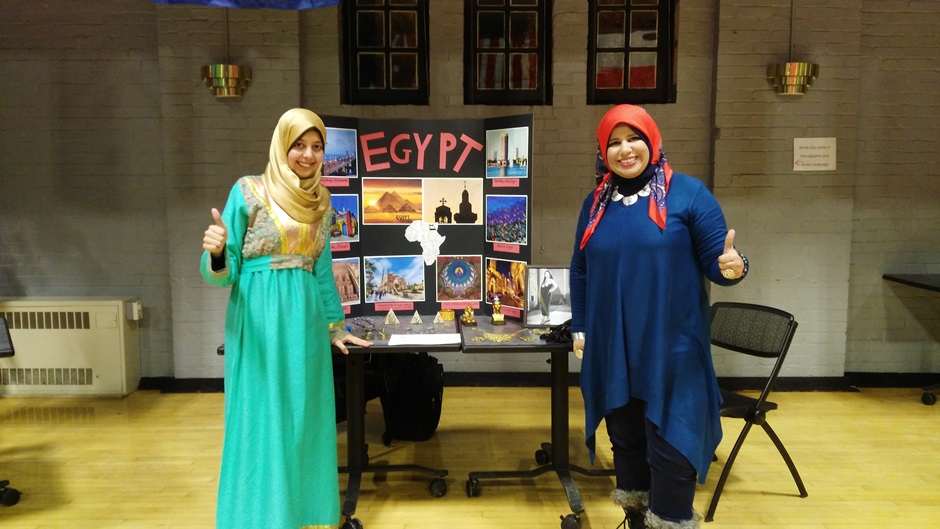
Omnia Ali – Empowerment Through Volunteer Work
USAID-funded HEI MBA scholar, Omnia Ali, arrived in the US in August 2015 as an HEI MBA scholar at Baldwin Wallace University in Berea, Ohio. Baldwin Wallace’s Business School located in a small town in Ohio, at least an hour away from any major city. When she first arrived, the location and the lack of resources for international students at her university presented quite a challenge. Additionally, Omnia did not come from a business background and therefore the MBA program, coupled with the language barrier, only added to her frustrations. She felt she must dedicate all her time to her studies with little left for any extracurricular activities. After just a few months of “doing nothing,” Omnia took the initiative to remove some of the obstacles keeping her from spiraling downward. She started with focusing on her English language skills to better communicate with students and improve her grades. With the help of her HEI tutoring allowance, Omnia received tutoring and writing help on campus. Her improved English language skills soon became the catalyst for her to pursue a plethora of volunteer and leadership opportunities in her community. Omnia said, “if you want to socialize, understand the American culture, build bridges, the best way to do that is by acting not talking. Volunteering will help you to do this.”
Omnia joined “Campus Kitchen” an organization that aims to reduce food waste and address food insecurity for those without access to healthy food. Her first semester, she began simply by packing lunches for ministries through Campus Kitchen and soon advanced into a leadership role in marketing and publicity. This allowed her to reach out to other organizations, exposing her to new people. After her first year, Omnia became a member of several clubs including the MBA Association, Digital Marketing Clinic, Martial Arts Club, African Student Organization, and became the Vice President of Art Attack. Omnia immersed all of her free time into volunteer and community service for the causes she believed in.
In addition to her volunteer work, the desire to give back and her belief in social change drove Omnia to employ her skills as a Wen-Do self-defense trainer to empower female students on campus to protect themselves from sexual harassment. According to Omnia, she was surprised to learn of the harassment that American women face in the United States: “Empowering women and creating a safe community for women is a life mission, not only in Egypt but all over the world.” After several months of persistence, Omnia held an info session and workshop on Wen-Do at Baldwin Wallace University.
Omnia continues to “build bridges” between herself as an Egyptian and her campus community. Most recently, Omnia, and her roommate, another Egypt HEI scholar, Nermeen Abdelmoula, hosted a table on Egypt at an International Student Services event on campus. She presented a short video on Egypt, wrote students’ names in Hieroglyphics and Arabic, wore Egyptian cultural dress, and cooked Egyptian food. She was even asked several questions about her hijab and she was approachable and informative with her answers: “When (students) feel comfortable to ask these questions, that means they are starting to trust you and want to know more about you and your culture.”
Omnia has made a name for herself on campus and in the surrounding area. She took advantage of the limited resources available to her in her small campus community to create linkages with Americans and make a positive impact in her community. She has not only gained academic skills but also invaluable soft skills to utilize in real-life situations back home in Egypt. Omnia hopes that future HEI scholars will learn from her new-found service and leadership skills: “If you want to have a better world with no hunger, war, ignorance, pollution, disease, we have to start with ourselves, and with the community we live in. Every act will make a difference.”
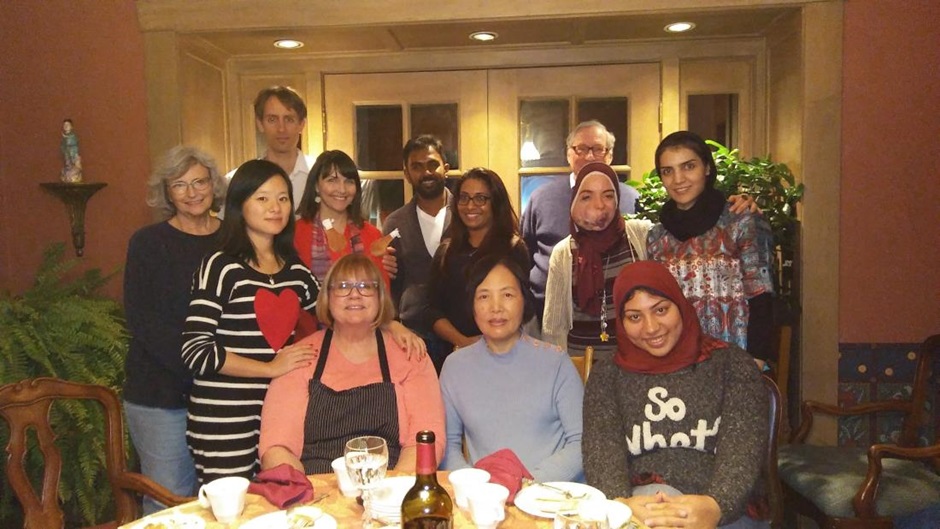
HEI MBA Cohort two Riham Mahmoud
HEI MBA Cohort two scholar, Riham Mahmoud attending University of Akron, has made the best of her situation in the small town by taking advantage of every resource available to her.
When Riham first arrived, she immediately immersed herself in every opportunity she could. She wanted to represent her culture to the school so she participated in several international events on campus. She also befriended staff from Global Ties Akron (an organization that helps place international students with host families) and was invited to attend a Thanksgiving meal along with other Egypt HEI scholars at one of the representatives’ homes.
Furthermore, through this connection, she made another connection with a music major at Akron who inspired her to learn the guitar. Riham used her entire winter break to practice the guitar 3-4 hours a day and is very happy to have taken on an activity she never thought she would pursue.
Additionally, at the beginning of her semester, Riham had a difficult time understanding one of her business professor’s accent and felt she would not do well in this class. However, she was very proactive and spoke to the professor regarding this issue and attended his office hours several times a week in order to ensure she understood all lectures.
Riham is now performing very well in her course and has developed such a close professional relationship with her professor that he is now her favorite educator at the university. Riham serves as a role model for international students who are newly adjusting to an unfamiliar environment and there is no doubt she will flourish in her time at Akron.
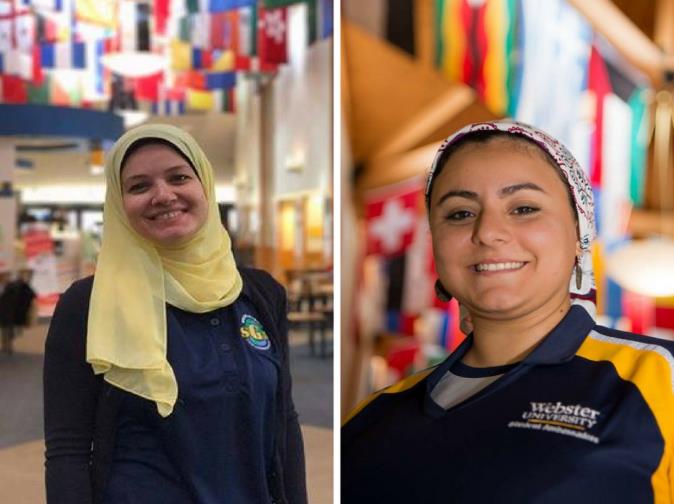
Dina and Eman: Demonstrating Leadership at the Walker School
USAID funded HEI scholars Eman Fahmy and Dina Sallam are two excelling graduate MBA students from the Walker School of Business & Technology, months away from graduation. They are also representatives of a group of twelve promising Egyptian women leaders studying at Webster University in St. Louis.
Eman and Dina both received their undergraduate degrees in Cairo, Egypt, where they had wonderful experiences, but wanted to further their education. Eman wanted to do so in the U.S., “[she] even prayed about it.” She believed that the United States education system was the best across the globe, bringing leaders who will make decisions for our world in the future. She knew she had to be a part of it.
Eman and Dina learned of the HEI scholarship opportunity through a Facebook post. Eman realized she fit the requirements and applied immediately. Dina said she was working full time when she discovered the opportunity, just days before the application ended.
After a rigorous application process, including three interview rounds with thousands of applicants, Eman and Dina were selected for the HEI program.
The recipients of the HEI scholarships are, as Eman describes, “girls that showed ambition and natural leadership abilities.” They must also prove financial need, maintain good grades, and keep up with an immense amount of documents, as well as take pre-departure classes on the GMAT and U.S. culture. Finally, the women must also commit to returning to Egypt upon graduation to exercise their skills and leadership in their chosen industries.
Dina has been surrounded by the motto “yes we can.” It was the motto of the company she previously worked at, and that of the presidential administration that initiated the scholarship. When it was time to move to St. Louis, she was assured she could do it. She said, “I was not worried” but rather “ready to engage in the U.S. culture and try something new.” Eman reports she was told the culture would have stark differences, however that did not hinder her because, “we are all still human beings.”
Eman and Dina are nearing the end of their graduate studies in May, however their overall impact on Webster University is far from finished. The student organizations that have been and still are being improved by these women’s service include Student Ambassadors, First Year Experience, Student Government Association, International Student Association, and Graduate Student Association. When they were asked why they made involvement such a priority, Eman testified, “For me it’s not just a scholarship, it is a chance to represent my country.”
With new diplomas and knowledge in hand, the women have service and constant improvement still at the forefront of their minds. Eman’s goal is to work at the United Nations in some capacity and seeks to be the first Prime Minister of Egypt, a position that has never been occupied by a woman. Eman possesses a strong desire to alter the ideas of conflict between the U.S. and Middle East in all of her pursuits. Dina too believes the women in the program have abundant potential to bring about change.
“Women know where the problems lie in their industries, private, government, or education, and now with their degree, they will be able to work towards the solution.” Eman concludes, “We have a lot of work to do. Our education was a gift and we are obligated to help those that don’t have the same gift.”
“We have to be more accepting of each other.” Dina knew this wasn’t always easy, however, she said, “You don’t have to go against yourself to find a common ground [and] be flexible even if they have different idea, perspectives and worldviews. Also, enjoy life.”
Eman advised to always stay open to new opportunities even if they seem difficult. “You should not expect that all people will believe in you, but my advice is to keep your sight on the goal and nothing, not money or nationality will hinder you from achieving it.”
Eman noted that success isn’t always easy, especially for women, therefore greatly admires President Stroble’s influence on her life. She continued, “I want to thank you [U.S. citizens] for letting me study my passion.” “You are making a difference in the world in indirect ways”.
Finally both Eman and Dina said that they hoped to have made the program and those involved proud, and they are confident in confirming that they have made people more than proud, they have made and will continue to make a significant difference.
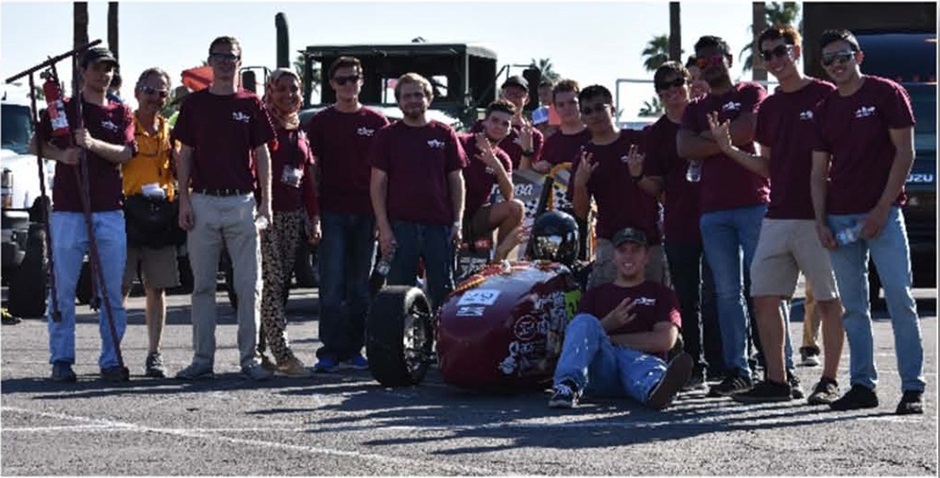
HEI STEM Cohort two scholar Azza Amer
HEI STEM Cohort two scholar Azza Amer, is a first-year student at Arizona State University (ASU) studying for her Bachelor’s degree in Mechanical Engineering. In her first term she joined the Society of Automotive Engineers (SAE) club at ASU. The SAE is a national club and the chapter at ASU is called the Sun Devil Motorsports. From the outset of joining the SAE club, Azza has been breaking barriers not only as an Egyptian, but also as a woman. She is the first, and only, woman in the club and has been given more and more responsibility as she has proven to be a valuable member of the team.
Azza said, “At the beginning of the semester I was looking to develop my skills. I asked my programming professor how I could practice and improve and he told me that I could join some clubs to help me and he recommended some to me. Some clubs are more difficult to join, you have to already have the skills to join, and I wasn’t someone like that. I joined this club and they gave me the resources to learn the skills that I needed. Half of the things I needed to learn on my own, and half of the things they took time to teach me”.
The SAE club’s mission is to design and build racecar prototypes from scratch and this has given Azza an opportunity to grow and gain practical experience in the field of mechanical engineering. As a member of the club, she has been given the opportunity and means to conceive, design, and fabricate a high-performance racecar. In the club, she is exposed to different methods and equipment that enables her to apply engineering concepts she learns in the classroom to real-world applications. Beyond the scope of gaining practical engineering skills, she also learns about financial and managerial challenges associated with building a product including applications in mass production.
“I’m not like a sociable person who likes to go out and do many things. I am someone who likes to concentrate on one thing or two things. This club is not wasting my time, it is like being in a class, but not for credit. It is like learning new things, but for free. All you have to do is pay attention and you will learn and your credit is being valued by the club, learning new skills, and getting promotions”, Azza mentioned.
She continued, “People don’t like to see girls in the mechanical engineering major. Some people told me that they don’t like to see girls in that major”. However, I think that because one person said that a lot of girls try and join, but they don’t come because they find it hard to interact with others. I think that when people make it difficult for a girl to get involved and when you are ignored so much, you will leave. But, if you try and say “I want to make something! I will try to make something.” And keep asking for work to do, then they will give up on ignoring you, but if you are not proactive, then they will keep ignoring you.
Azza concluded, “In this club I know how other people might look at me from their perspective, and I actually appreciate their point of view, and I am able to learn about how they think about Muslims or other Arabian people. I think it was a safe space for them, and they weren’t pushing their point of views and it is great having friends from different places around the world”.
“My dream is to build a factory for cars and fabricating from A-Z and making Egyptian cars, not just German or Japanese cars. We can make Egyptian cars from Egyptian engineers”, said Azza.

Esraa Sayed – On Self-Confidence and Success
USAID-funded HEI MBA scholar, Esraa Sayed, traveled to the US to pursue her MBA degree at the University of Akron with high hopes, not knowing what the experience holds. Before joining the HEI scholarship program, Esraa felt uncertain about her future and changed jobs often. She was also shy of her English speaking skills and afraid what others may think of her Muslim background. Esraa said, “I was worried at the beginning about my accent. I was so cautious to not offend anyone. I was also worried about being a Muslim in the US and how people may not accept me because I am different”. Further, she felt the greatest obstacle towards a successful university experience and potential career was her lack of self-confidence.
Soon after her arrival to the US, Esraa decided to take initiative to and get involved in the Akron community. She secured an internship at the Akron Global Business Accelerator, an entrepreneurial community that focuses on technology-based startups and early-stage companies in diverse fields. Through her internship, Esraa participated in the ICorps program, a partnership between the Akron Global Business Accelerator and the University of Akron Research Foundation where students develop innovative ideas that they work to transform into commercial products. As part of the program, Esraa observed presentations by young entrepreneurs, she learned the difficulty of introducing ideas to the market and the drive to persevere in order to achieve one’s goals.
More importantly, Esraa receives the support she needs, helping her believe in her own abilities and skills. She soon realized the significance of the Accelerator: to provide start-ups with a positive, encouraging work environment which gives students a chance to work on their innovative ideas. Esraa began as an observer, but is now developing her own business strategy. Encouraged by her progress, Esraa is now and active member of the Northeast Ohio student Venture Fund, a student-run non-profit venture capital firm. Students from universities around Northeast Ohio meet weekly to discuss companies applying for potential funding.
Esraa plays an integral role in exercising due diligence in reviewing project ideas and helping decide who will secure investment. She also serves as an International Students’ Representative in the Graduate Student Government and part of the Budget and Finance group in her University Council. Most notably, she participated in a discussion panel on rethinking race and ethnicity. It was one of the first times Esraa was able to talk openly about being a Muslim in America – something she had feared since she first arrived.
During her time in the US, Esraa is committed to developing her leadership and business skills, as well as her self-confidence. She feels her involvement in the HEI scholarship program not only allows her to pursue an MBA degree, but also gain confidence in her abilities that she never had before.
“I started gaining this confidence when I began interacting with fellow students, and found that they liked me. When I shared my own ideas and found others interested in exchanging their knowledge and experiences. When everyone understood my accent and praised me for being a good public speaker even when I was speaking a language that isn’t my mother tongue!”, Esraa said.
Through the support and encouragement Esraa receives as an HEI scholar, she learned to appreciate herself and her own efforts. She realizes that although her MBA is valuable in itself, the impact this experience has on her character is of the utmost significance. “I learn every day from all my experiences, and the most important benefit is that I found my passion.”

HEI STEM Scholar Helps Settle Refugees in the U.S.
USAID funded HEI scholar, Nada Abdelfattah, arrived to the U.S. in August 2016 to pursue a Bachelor of Science in Electrical Engineering at Montana State University (MSU) in Bozeman, Montana. Having grown up in a bustling neighborhood of Cairo, Nada had a lot to adjust to in the quaint, mountain town of Bozeman. Physically, it took a couple of months to acclimate to the major change in altitude and cold climate. Nevertheless, Nada had a blast during her first blustery Montana winter when she experienced snow for the first time!
During winter break, Nada and two other HEI scholars Mona Abdelgaid (STEM Cohort I – Montana State) and Alaa Abdelgawad (STEM Cohort 1 – University of Arkansas) traveled together along the west coast visiting Los Angeles, San Diego, San Francisco, and Seattle. She loved visiting new cities and exploring the diversity of American culture. However, at the end of the trip, Nada felt appreciative to return to Bozeman which had slowly become her home away from home.
Since 1996, Montana State University’s Student Engagement Office has sponsored the MSU BreaksAway program. On MSU BreaksAway trips, which are led by MSU Student Site Leaders, students volunteer their time to meet the needs of communities across the U.S. and globally. According to the MSU International Student Office, the mission and purpose of the BreaksAway program is “to cultivate in MSU students a spirit of community involvement and to nurture service leaders who will give back to our state, nation, and the world.”
During Spring Break, Nada participated in the MSU BreaksAway trip called Refugee Focus. On March 13, 2017, Nada and eleven other students made the lengthy two-day drive from Bozeman to Phoenix, Arizona to meet with representatives from the partnering organizationLutheran Social Services of the Southwest, who are dedicated to helping over 5,000 refugees each year from troubled nations to establish new lives in Arizona. They assist with crucial matters such as establishing safety, community connections and economic self-reliance. Nada helped families from Syria, Congo, Iraq, Palestine, and more settle in to their new lives in the U.S. She cleaned and prepared the refugees’ new homes, packaged donated clothing and food, and even traveled to the airport to greet the families upon arrival. Nada’s favorite activity was taking the children of the families to a local baseball game. This program gave Nada the opportunity to experience the satisfaction of community involvement and the chance to think critically about societal challenges and the role one can play in addressing those challenges. In Nada’s words, “it was a life changing experience. I always want to find ways to volunteer with refugees in the future.”
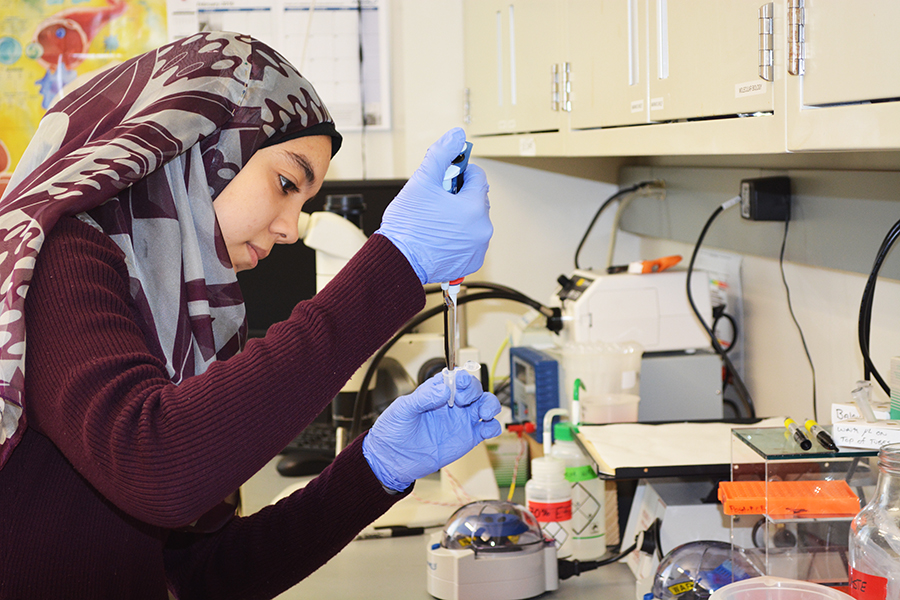
HEI STEM Cohort 2 Scholar, Marwa Mohamed
USAID funded HEI STEM scholar, Marwa Mohamed, arrived to the US in August 2015 to pursue a Bachelor of Science (BS) degree in Biomedical Sciences at Western Michigan University in Kalamazoo, Michigan.
Despite initial cultural adjustment challenges, Marwa hit the ground running after her arrival to Western Michigan University. Being an international undergraduate student at an American university was not an easy feat for Marwa. After all, it is challenging enough for native English speakers to adjust to a new environment, but Marwa’s cultural adjustment challenges did not get in her way of her academic success. Her passion for research in biomedical sciences was crystal clear. With a consistent 4.0 GPA and membership in the Honors College, her professors noticed her immediately and offered her research opportunities in their labs and teaching assistant positions in their classes. One of her professors nominated Marwa for scholarship and research opportunities and as a result Marwa has received two awards thus far. The first award she received during her fall 2016 term was the “Undergraduate Research and Creative Activities Award” from the College of Arts and Sciences that included a financial scholarship of $500. The second award she received during her spring 2017 term was the “Undergraduate Research Excellence Award” from the Office of the Vice President for Research that included another $500 monetary award. Marwa donated her financial awards directly to the lab that she is a part of.
Furthermore, Marwa’s interests in molecular biology offered her the opportunity to co-author a paper on planarian warms and patterns of abnormalities. The paper titled “Surgical Ablation Assay for Studying Eye Regeneration in Planarians” was published on April 14th, 2017 in the Journal of Visualized Experiments (JoVE). Marwa was also recently recognized by the Physics Department for her outstanding academic work during a ceremony held on April 20th, 2017, and was offered a teaching assistant position with her Physics Professor during the spring 2018 term. Marwa reacted saying, “I was astonished actually, but I accepted to do that as a volunteer as it is a fantastic experience to strengthen my understanding and also improve my communication and teaching skills.”
Marwa’s academic success did not get in the way of her leadership development and volunteering opportunities. Marwa volunteers regularly with the Kalamazoo Club, and after school club for elementary aged children where she helps them with their homework and plays with them. During her spring break for 2017, Marwa went on an alternative spring break trip to Philadelphia for various volunteering opportunities in the city with kids and a homeless shelter to.
Marwa will continue her lab research activities as part of her U.S. internship during the summer 2017 semester, and will continue to volunteer as her time permits.